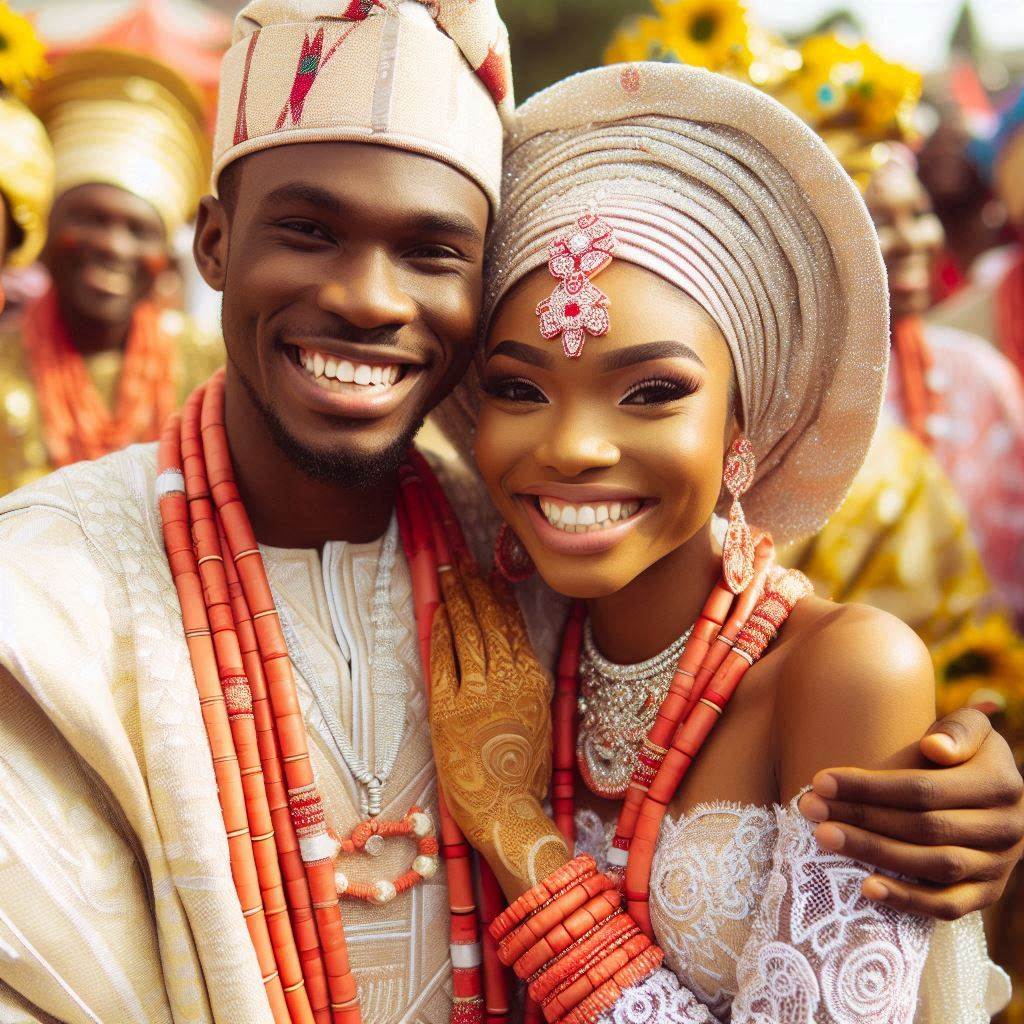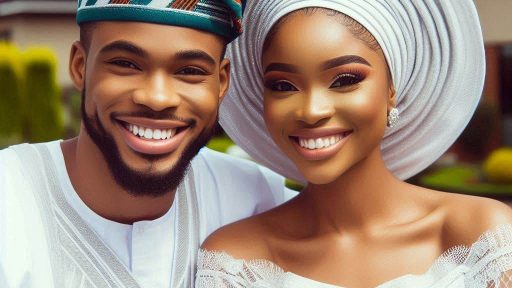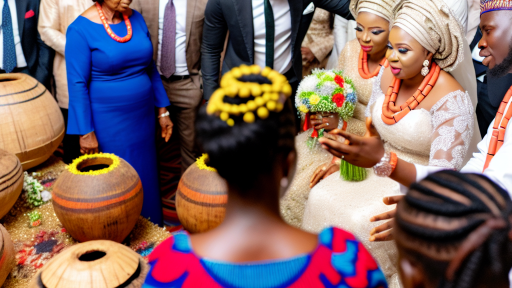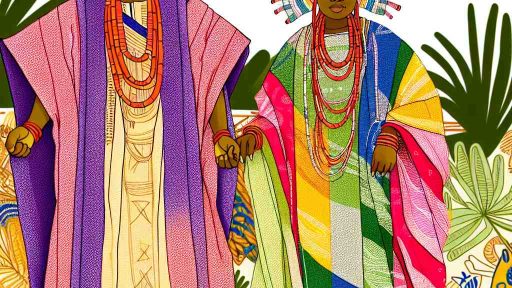Introduction
How Nigerian marriage traditions reflect family values and heritage is a fundamental cultural institution in Nigeria.
It binds families together, fostering unity and continuity.
Nigerian marriage traditions encapsulate customs that vary by ethnicity and region.
These traditions reflect deep-rooted beliefs and values associated with family life.
Overview of Marriage as a Cultural Institution in Nigeria
In Nigeria, marriage is much more than a union of two individuals.
It signifies the combining of families and the transmission of heritage.
Each ethnic group brings unique rituals, from traditional ceremonies to cultural practices.
These customs help preserve cultural identity and reinforce communal ties.
Importance of Family Values and Heritage in Shaping Marriage Traditions
Family values significantly influence Nigerian marriage traditions.
Respect for elders plays a crucial role in decision-making processes.
Families emphasize traits such as loyalty, commitment, and partnership.
In many cultures, one’s lineage is vital, shaping choices around marriages and alliances.
Nigerian heritage also plays an essential role.
It dictates the expectations surrounding marriage roles, responsibilities, and rights.
Understanding and honoring heritage foster a sense of belonging among family members.
The strong emphasis on lineage cultivates a deep respect for ancestry.
Purpose of the Blog Post
This blog post seeks to explore the connection between Nigerian marriage traditions and familial values.
By examining various customs, we aim to reveal how these traditions shape relationships within families.
In doing so, we uncover the deeper meanings behind rituals that may seem merely celebratory to the casual observer.
As we delve deeper, we will highlight specific practices and their significance.
We also explore how the modern dynamics of marriage intersect with these enduring traditions.
Ultimately, this exploration will enrich our understanding of marriage as a cultural pillar in Nigerian society.
Historical Context of Marriage in Nigeria
Overview of traditional marriage practices across various ethnic groups
Nigeria is home to a rich tapestry of cultures.
Each ethnic group maintains unique marriage customs.
Traditional marriage usually involves several key components, including bride price, ceremonies, and family involvement.
Here are four prominent ethnic groups and their practices:
Yoruba
In Yoruba culture, marriage starts with the proposal and acceptance rituals.
Families meet to discuss important details.
The groom’s family presents a list of items to the bride’s family.
This list typically includes cash, clothing, and other gifts.
The wedding ceremony includes traditional music, dance, and rites to bless the couple.
Igbo
The Igbo marriage tradition emphasizes the payment of a bride price.
This amount varies based on the family’s social status.
Before the wedding, there is an engagement ceremony called ‘I Do’ which includes the bride’s family giving their consent.
After a successful engagement, the couple celebrates their marriage with a colorful ceremony filled with traditional attire, music, and dance.
Hausa: For the Hausa people, marriage plays a vital role in community bonding.
The groom must pay a substantial dowry called “Sadaki.”
Hausa marriages often involve elaborate ceremonies that can last several days, showcasing rich cultural heritage through food, music, and traditional performances.
The family plays an essential part to reinforce values and lineage.
Efik
The Efik people also follow distinct marriage customs.
Their process begins with the bride price negotiation and ends with a traditional wedding ceremony.
The cultural significance of the event is reflected in the attire and the ceremonial rites performed.
The bride and groom often wear elaborate costumes, further symbolizing their heritage.
These practices highlight the importance placed on family values in Nigerian marriage traditions.
Evolution of marriage customs over time
Through the years, marriage customs in Nigeria have transformed significantly.
Modern influences often blend with traditional roots to create a unique experience.
Various factors have contributed to this evolution, including:
- Cultural Interactions: Nigeria’s diverse cultures interact continuously.
This interaction often leads to the blending of customs.
As families intermingle, merger of practices occurs, enriching marriage ceremonies with new traditions. - Urbanization: The movement of people to urban areas changes traditional marriage practices.
As younger generations adapt, they favor simpler customs.
Many couples prioritize personal choices over family traditions when planning their wedding. - Education: Increased access to education promotes changes in perspectives on marriage.
Educated individuals often question long-standing customs.
Many choose to redefine marriage to align with their values and beliefs. - Technology: The rise of the internet and social media affects how marriage is perceived.
Couples now share their experiences online, inspiring others.
This sharing often leads to the adoption of new customs and traditions in weddings. - Legal Changes: Government regulations have also influenced marriage customs.
The legal recognition of marriage encourages couples to formalize their unions.
This recognition often mandates certain ceremonies, leading to a shift in traditional practices.
These factors illustrate how Nigerian marriage traditions have adapted, reflecting changes within society.
Influence of colonialism and modernization on contemporary practices
Colonialism and modernization have significantly impacted Nigerian marriage customs.
The imposition of Western ideals created shifts in traditional practices.
Here are key influences that have shaped contemporary marriage customs:
- Christianity and Islam: The arrival of missionaries introduced new religious practices.
Many Nigerians now follow Christian or Islamic marriage ceremonies either alongside or instead of traditional customs.
This change leads to mixed marriages, creating hybrid wedding ceremonies that reflect faith and culture. - Westernization: Exposure to Western culture through films and media has altered perception of marriage.
Couples increasingly adopt Western elements, such as wedding rings and honeymooning traditions.
While many Nigerians still value traditional ceremonies, Western influences are evident in modern weddings. - Legal Frameworks: Colonial legal systems established framework for marriage institutions.
These laws emphasize formal registration and registration of marriages.
This legal perspective often clashes with traditional customs, causing tension between generations. - Gender Roles: Modernization has evolved gender dynamics within marriages.
Women’s roles are no longer limited to homemaking; they now pursue careers and education.
As a result, many couples renegotiate traditional roles, leading to more egalitarian relationships. - Globalization: The world has become interconnected.
Exposure to global marriage trends influences Nigerian weddings.
Couples often incorporate international elements into their ceremonies, creating unique experiences that blend cultures.
Through these influences, contemporary Nigerian marriages reflect a complex interplay of tradition and modernity.
Each of these elements forms the foundation of marriage in Nigeria, illustrating how traditions can evolve while maintaining their cultural significance.
Today’s marriage ceremonies stand as a testament to familial values, heritage, and resilience in the face of change.
Significance of Family in Nigerian Marriage Traditions
Role of family in the marriage process
Nigerian marriage traditions strongly emphasize the family’s role.
Families play a crucial part in how marriages are formed and celebrated.
They ensure that cultural values are preserved and honored through these unions.
Arranged marriages versus love marriages
Both arranged and love marriages exist within Nigerian society.
Each type comes with its unique characteristics and implications.
- Arranged marriages: In many communities, families arrange marriages based on compatibility.
Families consider factors such as social status, family background, and cultural values.
Arranged marriages often prioritize familial lineage over personal choice. - Love marriages: While arranged marriages are common, love marriages are increasingly accepted.
Individuals can choose their partners based on personal affection.
These marriages represent a balance between individual desires and family expectations.
Ultimately, the success of either type relies on family support.
Families help to reinforce bonds between couples, regardless of how the marriage was initiated.
Parental approval and involvement
Parental approval is vital in the marriage process.
Nigerian culture places significant importance on family hierarchy and respect for elders.
- Consultation with parents: Before formalizing a relationship, individuals often consult their parents.
In many cases, parents provide advice and guidance about potential partners. - Introduction ceremonies: These ceremonies involve introducing the partner to the family.
This event is a crucial step that demonstrates respect and acknowledgment of family ties. - Negotiation of bride price: Families may discuss traditional bride price, a vital component in many Nigerian marriages.
This negotiation further solidifies the bond between families.
The family’s involvement strengthens the relationship between the couple and their respective families.
This interconnectedness creates a support system that nurtures the couple’s future together.
Family expectations and societal pressures regarding marriage
Family expectations shape individual choices in the context of marriage.
These expectations often stem from cultural norms and societal pressures.
- Pressure to marry: Nigerian youth often face pressure to marry by a certain age.
Parents and relatives encourage marriage as a rite of passage and a marker of maturity. - Expectations for traditional rituals: Families expect adherence to traditional marriage rituals.
Observing these rituals demonstrates respect for cultural heritage and familial pride. - Societal perceptions of marital status: Being unmarried can lead to societal stigmas.
Family reputation becomes a priority, impacting individuals’ social standing.
Despite these pressures, individuals navigate their own paths.
They may seek to blend familial expectations with personal happiness.
Basically, the interplay of family values and heritage plays a significant role in Nigerian marriage traditions.
Families shape individual choices through arranged marriages and parental involvement.
The significance of family expectations further underscores how deeply familial connections influence marriages.
These traditions not only celebrate the union of two individuals but also reflect the rich tapestry of Nigerian cultural heritage.
Read: Deep Dive into Nigerian Marriage Cultural Practices
Symbolic Gestures and Rituals
Traditional ceremonies and their meanings
Nigerian marriage traditions encompass various ceremonial practices.
Each ritual holds significant meaning for families.
These ceremonies are more than mere events; they embody cultural values.
They serve as bridges between past and present, linking generations.
Introduction ceremonies
Introduction ceremonies act as the prelude to formal marriages.
Families from both sides gather to meet, solidifying relationships.
These gatherings foster respect and understanding.
During these introductions, families discuss the marriage intentions of their children.
It emphasizes the family’s role in the union.
Introduction ceremonies involve numerous rituals.
Typically, they include traditional prayers and blessings.
Elders from both families give their blessings, underscoring the importance of respect.
The couple also acknowledges family contributions, highlighting gratitude.
Wine carrying and bride price
Wine carrying is a vibrant ritual in Nigerian weddings.
The bride’s friends carry a calabash of palm wine and present it to the groom.
This act symbolizes the bride’s family’s acceptance and approval.
If the groom drinks the wine, it confirms acceptance into the bride’s family.
Another crucial aspect is the bride price.
The groom pays a stipulated amount to the bride’s family.
This payment signifies respect for the bride and her family.
It acknowledges the value of the bride and honors her upbringing.
The bride price varies by ethnicity, demonstrating cultural diversity.
Both rituals highlight the interconnectedness between families.
They reinforce the idea that marriage is a communal affair.
Each element emphasizes the importance of family values.
These traditions encourage strong familial bonds and cultivate respect among community members.
The impact of these rituals on familial bonds and community ties
Nigerian marriage rituals strengthen familial bonds by fostering unity and creating lasting memories.
These ceremonies bring families together, setting aside differences to celebrate love.
Here’s how these rituals impact families and communities:
- Fostering Unity: Families unite through shared experiences, reinforcing relationships and building lasting connections.
- Affirming Identity: Marriage ceremonies showcase family values, customs, and heritage, narrating unique stories that enhance cultural pride.
- Encouraging Belonging: Family members actively support the couple’s journey, with older generations passing down wisdom and guidance.
- Strengthening Social Networks: Marriage rituals extend beyond individual families, drawing in neighbors and extended family, creating a sense of community.
During weddings, traditions draw communities closer.
The vibrant display of customs aligns generations around shared values and beliefs.
Community members become invested in the couple’s happiness, fostering collective support.
Here’s how these activities strengthen bonds:
- Sharing Meals: Culinary traditions represent cultural heritage and familial history, celebrating not just the couple but the community.
- Dances and Songs: Festive gatherings deepen relationships and create camaraderie, building a vibrant support network for newlyweds.
In fact, Nigerian marriage rituals encapsulate cultural values and strengthen familial ties.
Each ceremony enhances bonds between families and communities.
These traditions reinforce the importance of love, respect, and support in marriages.
Understanding them provides valuable insights into Nigerian culture and showcases how deeply interconnected family and community ties are in society.
These practices continue to thrive, enriching lives.
Read: The Rise of Nigerian Bridal Couture and What It Means for Your Big Day

Gender Roles and Responsibilities
Traditional Views on Gender Within Marriages
Nigerian marriage traditions have deep roots in historical gender roles.
These roles dictate the division of responsibilities among spouses.
Traditionally, men are seen as providers and protectors.
Women, conversely, are primarily viewed as homemakers and nurturers.
- Men: Expected to provide financial support for the family.
- Women: Encouraged to manage household chores and child-rearing.
- Decision-Making: Predominantly led by men in many traditional settings.
- Community Roles: Men often represent the family in communal activities.
These traditional views are upheld by various customs and practices.
Cultural celebrations often reinforce these roles.
For example, during marriage ceremonies, the groom’s family displays wealth through gifts.
This act solidifies the man’s role as the family’s provider.
Expected Roles of Husbands and Wives in Family Dynamics
Family dynamics in traditional Nigerian marriages often illustrate distinct roles for husbands and wives.
These roles outline expectations for behavior and responsibilities.
Husbands
- Financial provider for the family.
- Protector against external threats.
- Leader in family decisions.
- Participate in community leadership.
Wives
- Caregiver for children and elderly.
- Manager of household finances and resources.
- Supportive partner in family decisions.
- Active participant in community activities.
This division of roles contributes to a stable family structure.
Each partner knows their responsibilities.
However, this setup can create tension when expectations clash with modern lifestyles.
Changing Perspectives on Gender Roles in Contemporary Nigerian Marriage
In recent years, perspectives on gender roles within Nigerian marriages have evolved.
Changing societal norms challenge traditional views.
Women increasingly pursue education and careers, reshaping family dynamics.
Education
- Women are achieving higher education levels.
- With education, women seek independence.
- Education opens doors to career opportunities.
Employment
- Women now contribute financially to the household.
- Men often share domestic responsibilities.
- This collaboration strengthens family bonds.
Changing Norms
- Men are beginning to embrace domestic roles.
- Shared parenting responsibilities are growing in popularity.
- Women are asserting their voices in family decisions.
These changes reflect a broader shift towards equality and partnership.
Contemporary couples often share responsibilities more equitably.
This harmony fosters a positive family environment.
Gender roles in Nigerian marriages reveal much about family values and heritage.
Traditional views remain strong, yet modern influences challenge these norms.
As families evolve, they reflect changing societal values.
Understanding these dynamics helps illuminate the complexities of contemporary Nigerian marriage.
Read: Discover How Igbo Traditional Weddings Influence Modern Marriage Practices
The Role of Religion in Marriage Traditions
Influence of Christianity, Islam, and Indigenous Beliefs
Religion deeply influences Nigerian marriage traditions.
Christianity, Islam, and indigenous African beliefs each play vital roles.
Each religion approaches marriage uniquely, reflecting cultural values.
Christianity emphasizes monogamy and sanctity in marriage.
Couples often wed in church services, seeking blessings from God.
This practice reinforces the idea of a union blessed by faith.
Islam, on the other hand, recognizes both polygamous and monogamous marriages.
The religious ceremony, known as the Nikah, affirms the union between husband and wife.
Religious texts and teachings guide the behaviors expected within this marriage.
Indigenous beliefs often intertwine spirituality with marriage.
Traditional rituals celebrate the union while honoring ancestors.
Many families honor their heritage through cultural practices during weddings.
Religious beliefs in Nigeria create distinct patterns regarding courtship and marriage.
These customs shape dating practices, engagement ceremonies, and the definition of family.
How Religious Practices Shape Familial Values and Marriage Customs
Religious practices significantly shape familial values in Nigeria.
They instill respect, duty, and commitment within families.
Religious teachings promote the idea of family as a sacred unit.
For instance, Christianity encourages couples to uphold values like love, patience, and forgiveness.
These principles guide behavior within families and during marital conflicts.
Couples often participate in counseling provided by their church before marriage.
Islam places great emphasis on the role of the husband as a provider and the wife as a nurturer.
This contributes to defined gender roles within families.
Such roles may impact the decisions families make regarding education and employment.
Indigenous beliefs stress the importance of community and collective responsibility.
Extended families often play active roles in wedding ceremonies.
Celebrations may involve entire villages, emphasizing social cohesion and shared heritage.
All religions encourage values such as loyalty and respect.
Couples learn these virtues through religious education.
They then integrate them into their marital lives, shaping family dynamics.
Inter-religious Marriages and Their Implications on Family Dynamics
Inter-religious marriages are becoming increasingly common in Nigeria.
These unions involve spouses from different religious backgrounds.
While they offer opportunities for intercultural exchange, they also face challenges.
Different religious beliefs often clash, causing tension within families.
For example, children from inter-religious marriages may struggle with their identity.
They may feel divided between two belief systems.
Families generally seek to uphold their religious traditions, which may complicate these unions.
Couples must negotiate their religious practices.
This often includes decisions regarding the upbringing of children and adherence to cultural customs.
In some cases, families may accept inter-religious marriages.
Acceptance often hinges on mutual respect for each other’s beliefs.
Strong communication skills help navigate cultural differences that might arise.
Religious leaders often play a role in these marriages.
They may provide guidance or mediation to help couples work through conflicts.
The impact of religion on family values is crucial in maintaining harmony.
Overall, the role of religion in Nigerian marriage traditions reveals a tapestry of beliefs.
Couples navigating these waters must do so while respecting their heritage.
This respect helps reinforce bonds not only between spouses but also between families.
Read: Navigating Cultural Differences for A Successful Nigerian Marriage
Contemporary Challenges and Changes
Nigerian marriage traditions face numerous contemporary challenges.
Globalization alters many aspects of these traditions.
Western ideals influence the way Nigerians perceive marriage today.
Economic factors also play a significant role in family decisions regarding marriage.
Additionally, societal perceptions of matrimonial practices are shifting.
All these changes impact the rich heritage of Nigerian marriage customs.
Influence of Globalization and Western Ideals on Marriage Traditions
Globalization has transformed many cultural practices worldwide.
In Nigeria, this transformation is evident in marriage ceremonies.
Here are some significant influences:
- Adaptation of Western Wedding Styles: Many Nigerian couples now adopt Western-style weddings.
They incorporate elements like white gowns and church ceremonies. - Individualism Over Community: Traditional weddings prioritize community involvement.
However, the rise of individualism shifts focus to personal preferences. - Online Dating: Digital platforms facilitate connections across vast distances.
This approach leads to marrying outside traditional networks. - Changing Gender Roles: Global movements push for gender equality.
This change affects expectations within marriages. - Customization of Traditions: Couples often blend customs from various cultures.
They create unique ceremonies that reflect personal values.
The infusion of Western ideals results in a hybrid of customs.
Younger generations find themselves navigating this mix.
They cherish traditional values while embracing modernity.
This often leads to discussions about which customs to retain and which to adapt.
The Impact of Economic Factors on Family Decisions Regarding Marriage
Economic factors significantly influence marriage decisions in Nigeria.
The current economic climate forces families to make tough choices.
Here are some crucial aspects impacting marriage:
- Cost of Weddings: Traditional weddings can be expensive.
Families face pressure to meet societal expectations, often leading to financial strain. - Dowries and Bride Prices: These practices can impose economic burdens.
Families must negotiate these amounts, creating potential conflicts. - Educational Attainment: As more individuals pursue education, marriage delays.
Emerging professionals often prioritize career stability over immediate family life. - Women’s Economic Independence: More Nigerian women are becoming financially stable.
This independence shifts their approach to marriage and relationships. - Urbanization: The movement to urban areas alters marriage dynamics.
City life creates new values and priorities that differ from rural traditions.
These economic factors lead families to rethink marriage.
They prioritize budget-friendly solutions while navigating cultural expectations.
The focus shifts toward finding a balance between financial viability and traditional practices.
Shifts in Societal Perceptions and Acceptance of Diverse Matrimonial Practices
Societal perceptions of marriage continue to evolve in Nigeria.
Acceptance of diverse matrimonial practices marks a significant change.
Here are important factors in this shift:
- Inter-Ethnic Marriages: There is growing acceptance of marriages across ethnic lines.
This fosters unity and minimizes ethnic tensions. - LGBTQ+ Relationships: Discussions around non-heteronormative relationships are gaining traction.
Though controversial, these conversations are crucial for societal acceptance. - Single Parent Families: The stigma around single parenthood is decreasing.
Society recognizes that various family structures can thrive. - Age Differences in Marriage: Societal views on age gaps in relationships are changing.
More couples are embracing diverse age ranges without fear of judgment. - Co-Habitation Before Marriage: Living together before marriage is increasingly accepted.
Couples seek compatibility before committing to traditional marriage.
These shifts reflect an evolving understanding of marriage in Nigerian society.
As diverse practices gain acceptance, traditional norms face scrutiny.
Younger generations challenge outmoded beliefs, leading to an inclusive environment that fosters the acceptance of alternative lifestyles.
In short, the landscape of Nigerian marriage traditions is changing rapidly.
Globalization introduces new ideas and practices that influence local customs.
Economic realities shape families’ approaches to marriage in profound ways.
Meanwhile, societal perceptions increasingly embrace diverse practices, broadening the scope of matrimonial possibilities.
As Nigerians navigate these contemporary challenges, they strive to uphold their heritage.
Balancing tradition and modernity is essential for forging harmonious relationships.
The future will likely see a blend of values that honors past customs while embracing contemporary realities.
The Intergenerational Transmission of Values
How marriage traditions are passed down through generations
Nigerian marriage traditions reflect deep-rooted familial values.
They embody the collective identity of various ethnic groups.
These customs are meticulously passed down through generations, creating continuity and connection.
Families often share stories about past marriages and celebrations.
Children grow up listening to these stories, fostering a sense of belonging.
This storytelling becomes a formal method of education.
Photographs and heirlooms further contextualize family history.
Key elements for passing down marriage traditions include:
- Family gatherings: These events serve as platforms for sharing stories and customs.
- Ritual participation: From childhood, children observe and participate in marriage rites.
- Mentorship: Elders guide younger generations in understanding traditions.
- Storytelling: Oral history plays a crucial role in communicating values.
- Formal ceremonies: Each marriage ritual serves as a live demonstration of heritage.
These practices instill respect for cultural heritage.
They ensure that future generations embrace their identity.
Children learn the significance of their lineage through these traditions.
They understand how marriage connects families and communities.
As they mature, this knowledge shapes their values.
They appreciate the importance of commitment, loyalty, and respect.
Teaching family values to children in the context of marriage
In Nigerian culture, marriage goes beyond personal union.
It represents a broader family connection.
Parents play a pivotal role in teaching their children about marriage.
They emphasize qualities like love, respect, and responsibility.
Children learn the importance of these values from a tender age.
Respecting elders and familial obligations form the cornerstone of this education.
Several approaches help instill these values:
- Conversations: Open dialogues about marriage and relationships support understanding.
- Role modeling: Parents demonstrate the values they wish to instill.
- Involvement: Children actively participate in marriage-related events.
- Lessons in patience: Parents teach the significance of communication and compromise.
- Community teachings: Children learn about diverse marriage customs from their communities.
Family values rooted in marriage have lasting impacts.
They shape how children view relationships.
Respect for partnership and commitment becomes fundamental.
As they grow, these values guide their choices.
They carry forward the teachings of their families into their adult lives.
Strong family bonds emerge from this collective understanding.
The role of elders in preserving heritage and customs
Elders hold a revered status in Nigerian society.
Their wisdom and experience play a crucial role in cultural transmission.
They act as custodians of tradition.
Elders ensure that marriage customs remain vibrant and relevant.
They often lead rituals and provide guidance to younger generations.
Their involvement affirms the importance of heritage in marriages.
The roles of elders include:
- Cultural mentors: They impart knowledge about historical practices and values.
- Ritual officiants: Elders officiate marriage ceremonies, reinforcing customs.
- Conflict mediators: They resolve disputes within families regarding marriage issues.
- Story keepers: Elders share narratives that preserve family legacies.
- Guardians of ethics: They remind families of moral obligations and responsibilities.
The continuity of marriage traditions relies heavily on these elders.
Their guidance fosters respect for cultural heritage among younger generations.
As children witness elders’ role, they appreciate the depth of their customs.
By leading ceremonies, elders embody the values they protect.
They involve younger family members, ensuring they learn the processes.
This mentorship reinforces family ties across generations.
Ultimately, the intergenerational transmission of values shapes Nigerian marriage traditions.
It blends cultural education with family dynamics.
Respect for history, commitment to family, and understanding of customs acquire significance.
The collective memory of marriage traditions strengthens community bonds.
As Nigerian society evolves, the core values persist.
Families adapt while retaining cultural identity.
This adaptability showcases the resilience of marriage traditions.
Through the roles of parents, children, and elders, these customs thrive.
They redefine what it means to be part of a family in Nigeria.
The fusion of modern influences and traditional values offers a rich tapestry.
This tapestry continues to educate future generations about their heritage.
Conclusion
Recap of the integral link between marriage traditions, family values, and heritage in Nigeria
Nigerian marriage traditions serve as a vital bridge between family values and cultural heritage.
They emphasize the significance of community, respect, and familial bonds.
Each tradition, whether it involves dowries or ceremonial rites, instills a sense of belonging and continuity among families.
Couples navigating these traditions inherit not just responsibilities but also rich legacies that shape their identities.
Through these practices, individuals connect with their ancestors and honor their lineage.
The customs reinforce societal norms, establishing expectations around marriage roles and responsibilities.
Reflection on the importance of preserving these traditions in a changing world
In our rapidly changing world, preserving Nigerian marriage traditions becomes increasingly crucial.
Modern influences often challenge these customs, risking their relevance and transmission to future generations.
However, upholding these practices fosters a deep sense of identity and belonging.
They offer a stable foundation amid societal changes, reminding individuals of their roots and responsibilities.
The enduring relevance of marriage rituals reflects the resilience of cultural heritage.
By embracing these traditions, families nurture a sense of unity and continuity across generations.
Call to action to appreciate and uphold the values embedded in Nigerian marriage practices
We encourage everyone to take an active role in appreciating Nigerian marriage traditions.
Learn about the customs that bind families together and shape societal values.
Share these traditions with younger generations to ensure they flourish.
Attending traditional ceremonies can deepen your understanding and respect for their significance.
Acknowledge the vital roles these customs play in fostering familial love and respect.
Let us all commit to upholding these beautiful traditions as they form the essence of Nigerian culture and heritage.




